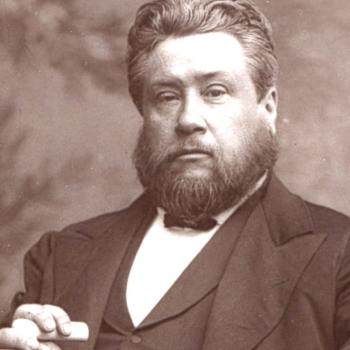He preached over 600 times before he was 20 years old. His sermons sold about 20,000 copies a week and were translated into 20 languages. The collected sermons fill 63 volumes equivalent to the 27 volume ninth edition Encyclopedia Britannica, and “stands” as largest set books by a single author in the history of Christianity.
Even if his son, Charles, was biased, his assessment is close enough to the truth:
“There was no one who could preach like my father. In inexhaustible variety, witty wisdom, vigorous proclamation, loving entreaty, and lucid teaching, with a multitude of other qualities, he must, at least in my opinion, ever be regarded as the prince of preachers.”
. . . There was not a week that went by in his mature ministry that souls were not saved through his written sermons. He and his elders were always on the “watch for souls” in the great congregation. “One brother,” he said, “has earned for himself the title of my hunting dog, for he is always ready to pick up the wounded birds.”
Spurgeon was not exaggerating when he said,
“I remember, when I have preached at different times in the country, and sometimes here, that my whole soul has agonized over men, every nerve of my body has been strained and I could have wept my very being out of my eyes and carried my whole frame away in a flood of tears, if I could but win souls.”
. . . He was my kind of Calvinist. Let me give you a flavor of why his Calvinism drew 5,000 people a week to his church rather than driving them away. He said:
“To me, Calvinism means the placing of the eternal God at the head of all things. I look at everything through its relation to God’s glory. I see God first, and man far down in the list … Brethren, if we live in sympathy with God, we delight to hear Him say, ‘I am God, and there is none else.”
. . . I do not look to soft and leisurely men to instruct me how to endure adversity. If the main answer is, “Take it easy,” I look for another teacher. Take a glimpse of this man’s capacity for work:“No one living knows the toil and care I have to bear … I have to look after the Orphanage, have charge of a church with four thousand members, sometimes there are marriages and burials to be undertaken, there is the weekly sermon to be revised, The Sword and the Trowel to be edited, and besides all that, a weekly average of five hundred letters to be answered. This, however, is only half my duty, for there are innumerable churches established by friends, with the affairs of which I am closely connected, to say nothing of the cases of difficulty which are constantly being referred to me.”
At his 50th birthday a list of 66 organizations was read that he founded and conducted. Lord Shaftesbury was there and said, “This list of associations, instituted by his genius, and superintended by his care, were more than enough to occupy the minds and hearts of fifty ordinary men.”
He typically read six substantial books a week and could remember what he read and where to find it. He produced more than 140 books of his own—books like The Treasury of David, which was twenty years in the making, and Morning and Evening, and Commenting on Commentaries, and John Ploughman’s Talk, and Our Own Hymnbook.
He often worked 18 hours in a day. The missionary, David Livingstone, asked him once, “How do you manage to do two men’s work in a single day? Spurgeon replied, “You have forgotten there are two of us.” I think he meant the presence of Christ’s energizing power that we read about in Colossians 1:29. Paul says, “I labor, striving according to His power, which mightily works within me.” “There are two of us.”
. . . Another Biblical conviction behind Spurgeon’s radical view of pastoral zeal is expressed like this:
“Satisfaction with results will be the [death] knell of progress. No man is good who thinks that he cannot be better. He has no holiness who thinks that he is holy enough.”
UPDATE
Website: http://www.desiringgod.org/
Email: [email protected].
Toll Free: 1.888.346.4700













